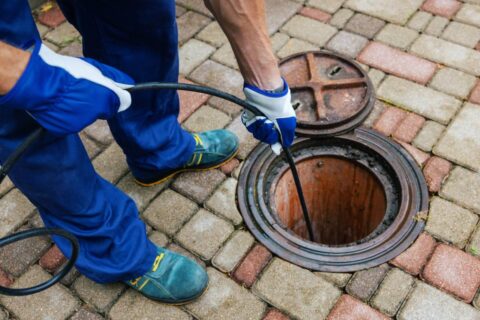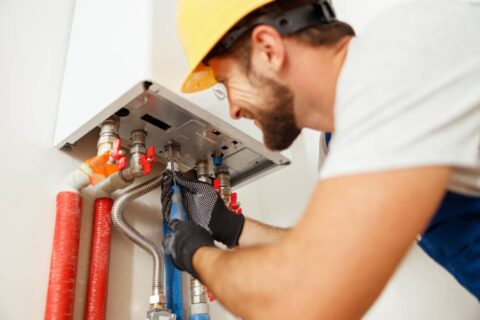How Do You Know if You Need a New Water Heater?
In-home access to hot water may not have always been a luxury (or even possibility) for the average family, but today it’s an essential part of daily life. Nowadays, a broken water heater is a major inconvenience at best and at worst can cause thousands of dollars in damages. It can also be difficult to know that your water heater is having problems before disaster strikes and repair, especially for an older water heater, is not always an option. Fortunately, Nautilus Plumbing has your back with a few telltale signs that you may need to start looking for a new water heater.
Age
It may seem like determining the age of your water heater could be difficult or even impossible, especially if it was already installed when you purchased your property, but there is an easy method to find out exactly how old your water heater is, all the way down to the month. Simply look for the manufacturer’s sticker on the top portion of your water heater, then identify the serial number on the sticker. The serial number should look something like this: “F051052638.” F represents the month, but don’t get confused, it’s not referring to February. F is the sixth letter of the alphabet, so it’s referring to the sixth month of the year, June. The next two digits tell you the year that your water heater was manufactured in. So, this water heater was manufactured in June of 2005. Codes may vary between manufacturers, so check your water heater’s manufacturer’s website to make sure you’re interpreting the serial number correctly.
Water heaters are generally recommended for replacement every 10 years, but depending on the type this can vary from 6 to 12 years. If your water heater has reached the end of its predicted lifespan and is in a place where it could cause serious damage to your home or business should it fail, it should probably be replaced. On the other hand, if your water heater is not showing any other signs of a problem and is in a place where it the only damage it will cause if it breaks is the inconvenience of replacement, you may want to hold off on replacing it, depending on your property’s hot water needs.
Ineffectiveness
The whole point of a new water heater is to, obviously, heat up your water, so if your water heater is no longer doing this effectively then it may be time to replace it. Ineffective water heating can manifest in water not getting hot enough, inconsistency in the heat of the water coming out of your faucets and showerheads, and quickly running out of hot water. This is often the result of a pilot light that’s gone out, so don’t panic before checking it, but in many cases, this is the result of a dirty water heater, not a failing one, but a dirty water heater can fail without proper action. As your water heater does its job, the minerals in the water separate and sink to the bottom of the tank where they build up and form a barrier between the burner and the water in the tank. As the heater works harder to get the water hot, the heater strains, eventually leading to the tank or control failing.
You can have your water heater cleaned annually by a licensed plumber. It can be tempting to try a do it yourself solution, but an unlicensed person risks damaging their water heater further, causing their heater to go from just dirty to needing replacement.
Noise
Is your water heater making rumbling, crackling, hissing, sizzling, or popping noises, particularly while it’s heating up? This is a pretty sure sign that your water heater is nearing the end of its road and needs replacing soon, likely due to the sediment build up we have just discussed. These noises are made when the heating elements strain to heat up the water, causing the tank to overheat and the metal of the tank to fatigue, and leading to its eventual failure. In some cases, just having the water heater flushed and cleaned is enough to keep it functional for a few more years with careful maintenance, but often your best bet is to simply replace the water heater rather than risking catastrophe when your water heater eventually fails.
Weird Taste, Smell, or Appearance
Even pleasantly hot water isn’t very helpful if it has an unusual odor, unpleasant taste, or unappealing appearance. Cloudy water with a metallic taste or strange odor can indicate that those mineral deposits have made their way out of the water heater and are traveling through other parts of your plumbing. Eventually, this can clog the screens of the aerators in your faucet and impede water flow. Rusty water can indicate the depletion of your water heater’s anode rod, which is used to prevent corrosion. Once the anode rod is gone, the tank itself begins to corrode instead. However, rust can also indicate rusty pipes, so have a plumber examine your water system before making major decisions.
Plumbing Solution in Los Angeles
New Generation Plumbing is Los Angeles’s most honest and affordable plumbing company. For over 50 years, our licensed plumbers have been servicing both residential and commercial properties. If you live in Downtown Los Angeles, Beverly Hills, Hollywood, Culver City, Marina Del Ray, Pasadena or the Valley, New Generation Plumbing is the only choice for your plumbing needs. Whether you are interested in a new tankless water heater, a traditional new water heater, or any other plumbing need, contact New Generation Plumbing to get your plumbing needs taken care of.


